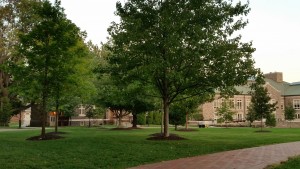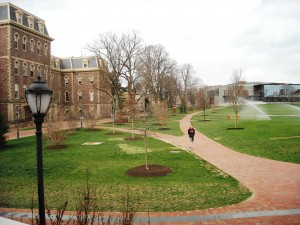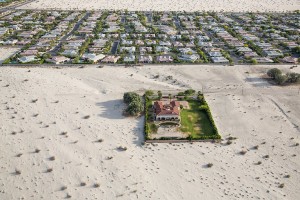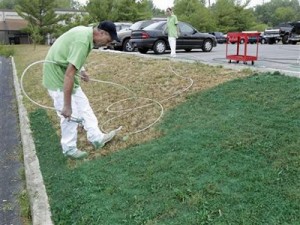this is the spot we were planning to hike to two weeks ago (pic stolen from the Catskill Native Plant Society facebook group):
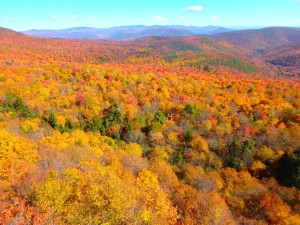
Dots on the Quad
Before this class, I had not previously paid too much attention to the landscaping choices around campus. I now find it interesting to note the straight lines of the well-maintained grounds and consider how much planning might have gone into a particular site. My work for the pollinator garden included acquiring approvals from the Facilities Planning and Construction department, so I understand the meticulous care behind the campus landscape. One feature that interests me is the appearance of the trees on the quad. These trees are planted on the green space and surrounded by a perfect circle of soil and mulch. These circles (and their respective trees) dot the quad and even seem a bit odd to my freshly tuned eye. The school has a high standard of campus beauty and appeal to maintain as a well-ranked liberal arts college. The aesthetic is a key component considered by prospective students. Beauty and functionality must meet in a perfect plan of the landscape. While the work absolutely pays off, I doubt many people consider all of the thought behind the ever-changing campus appearance.
Truckin’
This fall break I made the journey to and from Exeter, NH as I usually do, but I did it with a much shorter interval of time between drives. I drove home Sunday evening and returned to Lafayette Tuesday evening. Both trips took roughly 6 1/2 hours, but on Sunday I was alone, and on Tuesday I had four passengers. Not only was I thrilled to have company, and subsequent entertainment, I was stoked to provide transportation for those who might otherwise utilize their parents or a similarly under-utilized (in terms of capacity) mode of transportation. I thought to myself “this is why I drive an SUV” (though it is difficult to seriously call my ’06 Mercury Mariner and “SUV”).
So we loaded up the cargo space, tossed a roof storage sack on top, and were on our way. Now, my car is not very impressive with gas mileage. It breaks my heart to see how quickly the little arm drops on the fuel gauge, but I always keep track of what my MPG averages seem to be, just so I kind of know. On the way home, I was averaging over 21 MPG, which is not impressive or great by any stretch, but for a 4WD vehicle in Jersey, NYC, and Mass Pike traffic, it wasn’t bad. However, on the way back to school, I started to notice pretty quickly that the little arm was dropping rapidly in comparison to the recent identical drive. By the time we got back to Lafayette, I estimated the MPG for the trip was barely over 17. This was moderately traumatizing to me. 17?!?
So, this got me thinking. In this context- and perhaps in others- where is the sweet-spot of eco-conscious carpooling before it treks into this mileage-reductive realm I seem to have entered last night? I assume it was because with four extra people and all of their belongings (presumably cold weather apparel of the weighty variety) the little engine that could really couldn’t. I definitely felt more resistance when I tried to accelerate, and the car just generally felt a little laggy. But 21 to 17 is a fairly significant decrease. I wonder if this is true for other cars, and if so, what it means about smart carpooling?
3rd and Lawn
“The garden suggest there might be a place where we can meet nature halfway”.
Pollan’s idea about the balance between our relationship with nature and how when we mow or garden we find are able to fulfill that balance. In both his passages, Pollan points out the evolution of the lawn in America became a staple of society, but now as he suggests we are moving towards a more balanced experience when we garden.
I agree with this sentiment to an extent but I feel like Pollan sort of understated the value of a lawn itself. To me the lawn makes nature something more accessible. Not that it is a fully natural thing, I think lawns offer an easy way to get out. Like we talked about in class, lawns offer an openness that you don’t necessarily get in an unkempt field or wooded area. Lawns can offer a more social environment. Lawns give a place to run around, play a game of football, or just lay out.
I understand that there is an intimacy in gardening and that they might offer more in return than lawns but I’d still rather lounge around on a quad or play a game of wiffleball on a clean cut lawn than in an over grown field or a flowerbed. I don’t disagree that gardens are important but lets not dig up the lawn that can serve a purpose, as well.
Recycling
Over the weekend my uncle, knowing I’m an environmental studies major, brought up an article he had recently read in the New York Times about recycling. The article had been talked about in my environmental studies capstone class, but being environmental studies majors most of us had the same opinion: Even if all of the trash generated by americans for the next 1000 years can fit on one-tenth of 1 percent of the land available for grazing, we should still recycle because the ability to hide this trash doesn’t mean we shouldn’t worry about how much we have created and work towards reducing that amount. Even if some recycling is not nearly as productive as other kinds, and even if you’d have to recycle roughly 40,000 plastic bottles to offset the greenhouse effect of flying round trip between New York and London, even those minimal gains make recycling worth the effort.
It was actually really refreshing to hear another perspective on the story. While I did not agree with my uncle, he felt this article spoke to him and articulated the ways he had felt about recycling for a long time. That only the economically beneficial products should be recycled because the rest was a waste of effort for very little gain.
I have posted the article below, let me know what you think.:
http://www.nytimes.com/2015/10/04/opinion/sunday/the-reign-of-recycling.html?_r=0
Fall Break
I asked most everyone I saw when they returned from fall break, “how was your break?” The general response was “great” followed by some details of how there was not much movement from the persons couch or bed or house and a lot of tv time. I was struck by this because I pretty much did the same thing over my fall break, and then the few times that I chose to leave the house (mainly for the necessity of food), I was shocked to find how beautiful of a day it was outside. Probably the nicest and most relaxing part of my break was not when I was binge watching netflix, but the 2 hours I spent on the quad, soaking in the sun and tossing around a football with friends. I think our generation has moved to a point where relaxation is viewed as the choice of minimal physical movement and brain work. But while that may be “relaxing” is it really replenishing? Are we really getting a break when we do that?
Passages of Interest
“Nobody, in other words, can say what will happen in Cathedral Pines. And the reason is not that the forest ecology is a young of imperfect science, but because nature herself doesn’t know what’s going to happen here. Nature has no grand design for this place. An incomprehensibly various and complex set of circumstances – some of human origin, but many not – will determine the future of Cathedral Pines. And whatever that future turns out to be, it would not unfold in precisely the same way twice. Nature may possess certain inherent tendencies, ones that theories such as forest succession can describe, but chance events can divert her course into an almost infinite number of different channels” (Pollan 217).
This is the premise on which Pollan’s garden ethic lies, and I think it is entirely correct. Similarly to Pollan, I have taken issue with the separation between human-touched and virgin nature since that line is so incredibly blurry, as is explained in the above passage. In my first response paper, I defended the natural value of city parks. According to this passage, and the rest of his essay, Pollan would surely agree with my defense. City parks are under constant influence by park managers, visitors, and mother nature, herself. None of these forces can solely determine the future of the park. Just as no one can wholly predict the next days or years of their own lives, due to innumerable variables, such is the same with any space whether it be dubbed “wilderness” or “city park” or anything in between.
“The greatest gains and values are farthest from being appreciated. We easily come to doubt if they exist. We soon forget them. They are the highest reality. Perhaps the facts most astounding and most real are never communicated by man to man. The true harvest of my daily life is somewhat intangible and indescribable as the tints of morning or evening. It is a little star-dust caught, a segment of the rainbow which I have clutched” (Thoreau 236).
This passage speaks incredibly to me because I couldn’t agree with it more. I, too, believe that the most profound values of living are infinitely difficult, if not impossible to verbalize. In my second response paper, I wrote that words and measurements can only get asymptotically close to describing natural reality, though they can never fully detail it. I believe, as Thoreau also does, that the deepest and truest gains from living share this quality. Perhaps it is because those gains are embedded within our relationship with the natural world. This relationship, according to Thoreau and myself, is indescribable.
Interesting Passages
“It is a soothing employment, on one of those fine days in the fall when all the warmth of the sun in fully appreciated, to sit on a stump on such a height as this, overlooking the pond, and study the dimpling circles which are incessantly inscribed on its otherwise invisible surface amid the reflected skies and trees” (Thoreau, 205).
This passage stood out to me because I feel I can relate to this. In his descriptions of the fall, Thoreau depicts what may be seen around us now. The temperatures of this season force us to appreciate each warmer day, and the warmth we enjoy now would have seemed quite cold a few months ago. Perspectives change with the seasons, and this passage highlights the peacefulness of a pond, especially at such a time. At home, there is a pond out in the woods that is fascinating to enjoy with its reflective and mostly smooth surface. The passage describes a beautiful setting, and it shows how Thoreau does truly feel a strong sense of attachment, appreciation, and love for Walden.
“Flint’s Pond! Such is the poverty of our nomenclature. What right had the unclean and stupid farmer, whose farm abutted on this sky water, whose shores he has ruthlessly laid bare, to give his name to it?” (Thoreau, 214)
Thoreau again addresses the idea of naming things. The importance of names and titles appears to be an important, recurring theme in class. A name defines, acknowledges, honors, or references someone or something. Thoreau discusses some ordinary farmer who happened to have a pond nearby, which became known as his own. He does not necessarily think this fair to the land and to history. He declares later that if naturally-occurring, beautiful locations are to be named after men, then it should only be the greatest and noblest men of all to represent nature.
America’s Infatuation With Lawns
Should the grass always be greener on the other side… even if it’s in the desert? The piece “Why Mow?” highlights some of America’s obsession with lawns. I won’t lie, I love green grass as much as the next suburban resident, but I’ve never seen a green lawn as a necessity.
However, it seems as if most American’s crave a luscious, green lawn. Even here at Lafayette, we are constantly watering the quad to ensure its health and liveliness. In arid regions like California and Las Vegas, growing suburban neighborhoods are surrounded with unnatural green lawns, which require massive amounts of water that those communities can’t afford to waste. Is green grass really worth all of that water?
While the aesthetic of a green lawn is generally welcomed by the average American, its hard to justify wasteful practices to maintain a colorful space. Our obsession with grass begs the question… how far will we go to maintain our curbside appeal?
Politics and Climate Change
I’ve been watching the Democratic debate, hoping that there would be more discussion of climate change than there was in the Republican counterpart, and I am happy to report that this has certainly come true. Moderator Anderson Cooper asked each of the candidates what the most important national security threat was to our nation going forward, and two of the five candidates highlighted climate change. Governor O’Malley and Senator Sanders, only having about ten seconds to highlight the largest point of the national security segment, took part of this time, and Senator Sanders took all of his time, to discuss how climate change is more important than current military threats.
To think of how far the movement has come in such a short time is amazing. Since the turn of the century, given our military history, it would be practically unimaginable to think that a politician would place climate change over terrorism, or conventional military threats. Granted, talk is cheap until action is taken, but the fact that serious contenders for the Democratic nomination, and the Presidency, are willing to call climate change the most important national security threat, well that’s a good sign.

